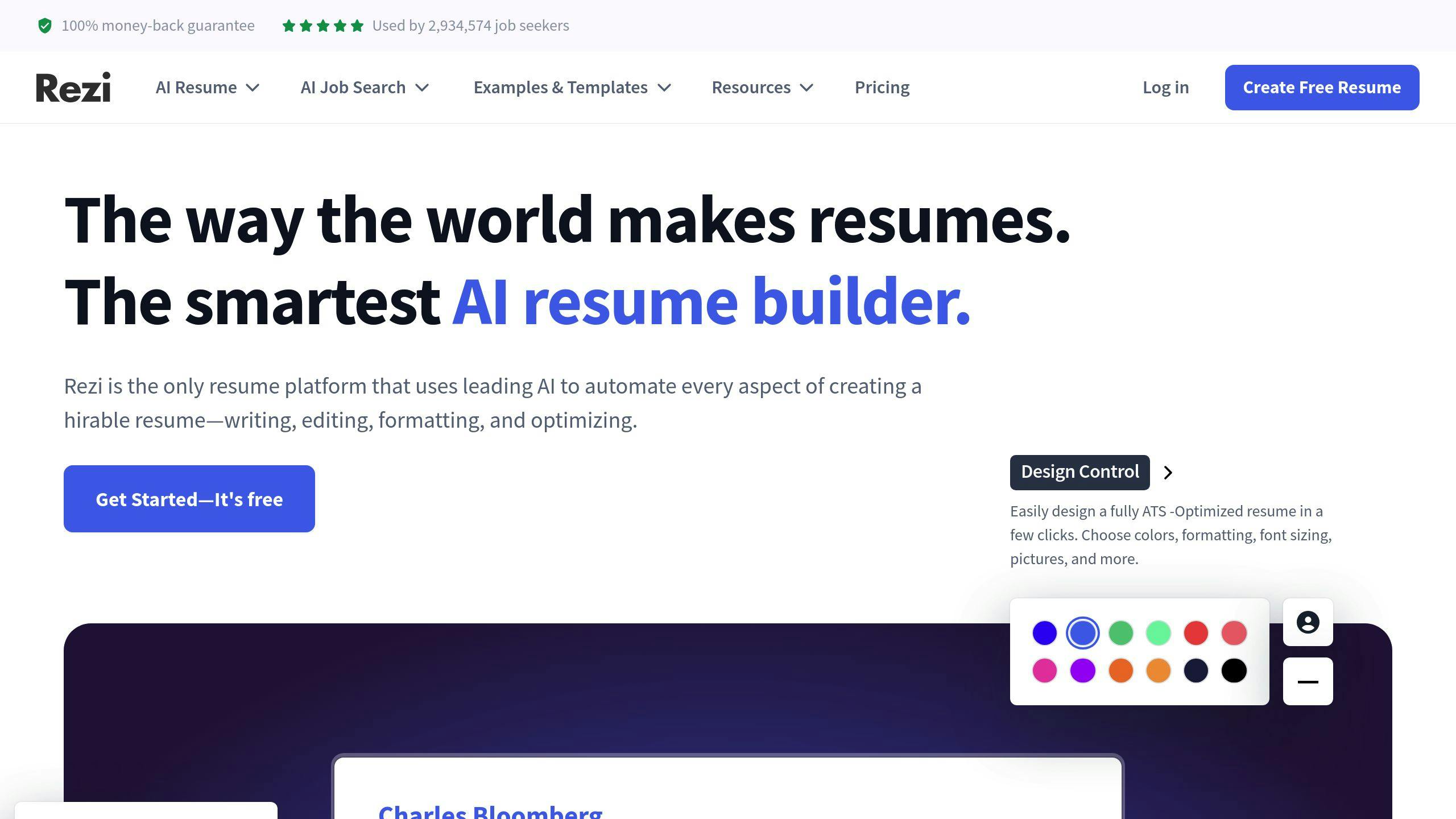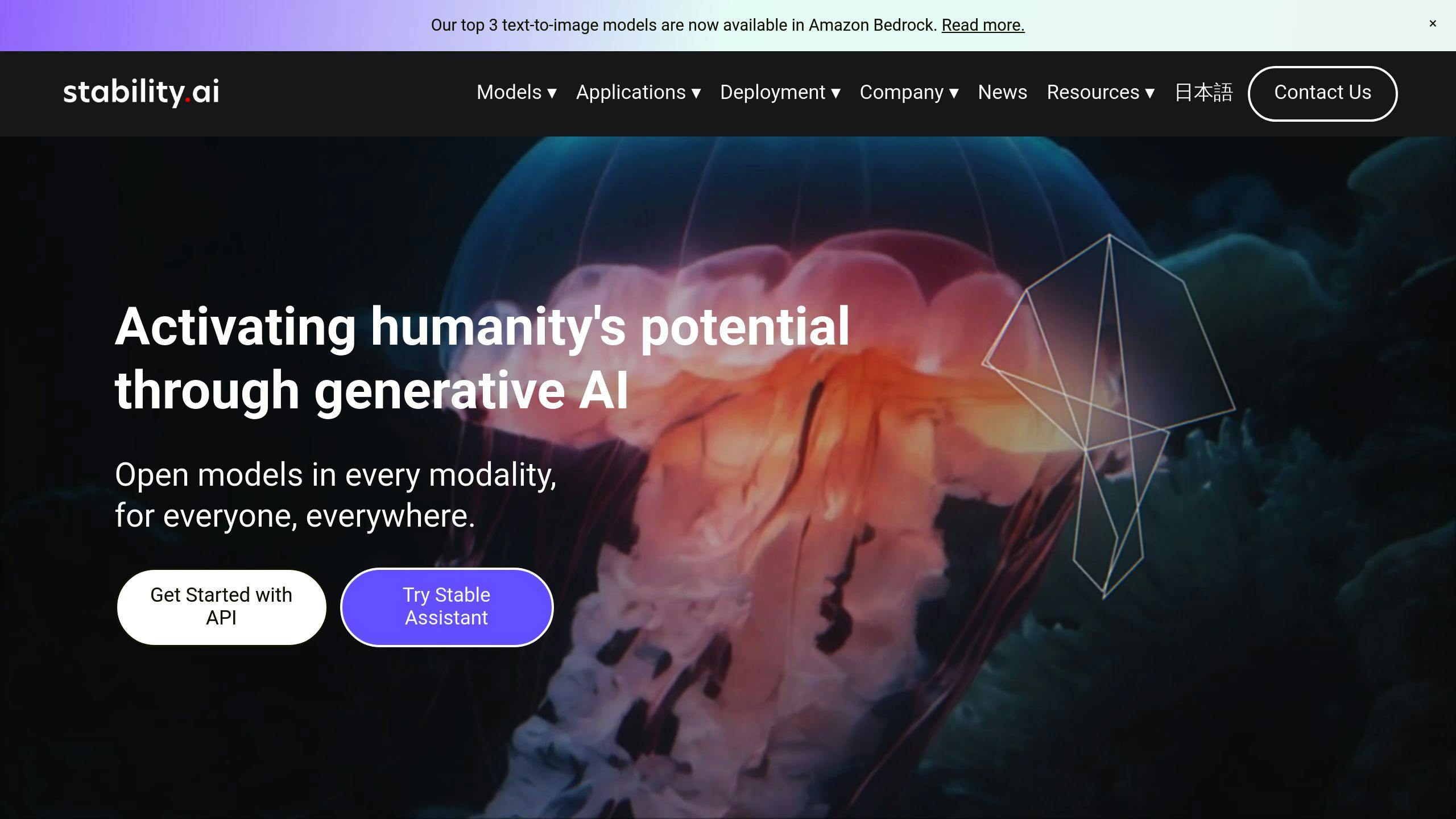Personalized AI tools can boost customer engagement - but only if used ethically. This means prioritizing trust, privacy, and fairness while meeting regulations like GDPR and CCPA. Here are five AI tools that help businesses personalize responsibly without compromising user data or trust:
- AI for Businesses: A directory of ethical AI tools with transparency, bias audits, and compliance features.
- Looka: AI-powered branding with clear design processes and data security.
- Rezi: Resume-building AI focused on fairness, inclusivity, and user privacy.
- Stability.ai: Open-source creative AI with bias prevention and strong privacy measures.
- Writesonic: Content creation AI that emphasizes transparency, bias reduction, and secure data handling.
These tools are designed for small and medium businesses to balance personalization with ethical practices, ensuring trust and sustainable growth.
The ethics of data: Privacy vs. personalization
1. AI for Businesses

AI for Businesses serves as a directory designed to help SMEs and scale-ups integrate personalized AI tools while adhering to ethical guidelines. Its focus on ethical AI personalization aligns with widely recognized industry standards.
The platform emphasizes transparency by providing documentation for each tool, explaining how algorithms make decisions. This approach builds trust and ensures clarity. All listed solutions must meet strict privacy and ethical standards, including:
- GDPR and CCPA compliance
- Systems for explicit user consent
- Routine bias audits
- Advanced data encryption measures
Pricing options range from free trials to enterprise-level plans, making these tools accessible to businesses of varying sizes.
"AI enables tailored recommendations but raises privacy concerns businesses must address." - Aicontentfy, The Ethics of AI Marketing [3]
To maintain high ethical standards, all tools undergo regular assessments, including privacy audits and bias evaluations. These measures ensure compliance with privacy laws and help prevent algorithmic bias while delivering effective personalization.
AI for Businesses also offers educational resources and expert consultations, which are particularly helpful for SMEs without in-house AI expertise. The platform continuously monitors updates to ensure its tools align with changing regulations and industry standards.
2. Looka

Looka is an AI-driven design platform that focuses on creating brand identities with a clear and transparent approach. It’s designed to help small and medium-sized businesses (SMEs) and growing companies build trust through responsible branding practices.
Transparent Design Process
Looka ensures transparency by offering detailed logs of its AI-driven design decisions. This allows users to make informed choices about their branding. The platform also prioritizes data security by encrypting user information, using it strictly for design purposes, and providing clear consent and opt-out options. To avoid bias in its design outcomes, Looka tests its systems with a variety of data sets.
Affordable Options for All Businesses
Looka offers pricing plans that cater to businesses of different sizes. Plans start at $20 for basic features and go up to $65 for premium options. This pricing structure makes AI-powered design tools more accessible while maintaining a focus on ethical and responsible practices.
Looka showcases how AI can streamline creative processes responsibly. Up next, we’ll look at tools that emphasize personalization in other areas of business.
3. Rezi

Rezi is an AI-driven platform designed to help users build resumes and match with jobs, focusing heavily on ethical personalization. It highlights how AI can support career growth while respecting user rights and maintaining transparency.
Clear AI Decision-Making
Rezi takes a straightforward approach by explaining how its AI makes decisions. This ensures users stay informed and in control of their career-related choices.
Fair Recommendations and Bias Prevention
To provide fair and inclusive results, Rezi uses:
- Diverse training datasets to reduce demographic bias
- Regular evaluations to assess fairness and inclusivity
- Ongoing ethical reviews tailored to recruitment challenges
Privacy-Focused Features
Rezi prioritizes user privacy with safeguards like explicit consent, data anonymization, clear documentation of data use, and customizable access settings. These steps protect sensitive career information.
Flexible Solutions for Businesses
The platform offers pricing options suitable for businesses at various growth stages. These solutions are designed to support ethical personalization while meeting the needs of small to medium enterprises and growing companies.
Rezi’s approach shows how AI tools can balance personalization with ethical practices and user trust. It sets a strong example of responsible AI use in recruitment and career development. Up next, we’ll look into Stability.ai and its focus on creative solutions paired with ethical personalization.
4. Stability.ai

Stability.ai takes a thoughtful approach to ethical AI, focusing on personalization while keeping transparency and user protection front and center. It's a solid option for SMEs and growing businesses looking for responsible AI-driven solutions that are both practical and trustworthy.
Commitment to Transparency
Stability.ai uses a "safety-first open-source" model, inviting public scrutiny of its AI systems to promote ethical practices. To ensure accountability, the platform requires a "Powered by Stability AI" attribution on all distributed AI-generated content.
Reducing Bias in AI
The platform actively works to limit bias by filtering unsafe training data, allowing content removal requests, and promoting diverse representation in its outputs. Jerry Chi, Head of Japan for Stability AI, explains, “While biases in AI models can't be completely eliminated, Stability.ai is committed to managing and adjusting them for various cultural contexts.”
Strong Data Privacy Measures
User data is protected through clear consent requirements, no sharing with third parties, and secure storage on AWS cloud servers. For privacy-related concerns, users can reach out to privacy@stability.ai for dedicated support.
"Public safety is our top priority; we may limit code releases to prevent misuse while assessing safety impacts." - Stability.ai Team
Tailored Solutions for Businesses
Stability.ai offers free access for businesses earning less than $1 million annually, along with scalable enterprise solutions and APIs for easy integration. These options make it easier for SMEs to adopt AI while maintaining trust and compliance.
Stability.ai shows how personalization can align with ethical principles in creative AI solutions. Up next, we’ll dive into Writesonic, a platform that emphasizes ethical AI in content personalization.
sbb-itb-bec6a7e
5. Writesonic

Writesonic takes a thoughtful approach to AI-driven content creation, making it a strong choice for small and medium-sized businesses (SMEs) looking to implement personalized content strategies responsibly.
Clear AI Processes
The platform prioritizes transparency by tracking how content is generated and ensuring compliance with relevant regulations. Its regular algorithm assessments help maintain ethical practices while fostering user trust.
Reducing Bias in Content
Writesonic works to minimize bias by refining its systems regularly. It takes into account ethical concerns specific to the content being created, using ongoing evaluations to adjust AI outputs when needed.
"AI-driven personalization is not just about efficiency; it's about creating a more human experience for our customers." - Samanyou Garg, Founder of Writesonic
Strong Data Security Measures
The platform protects user data through explicit consent, secure storage systems, restricted access, and frequent privacy audits.
Tailored for SMEs
With a 4.5/5 rating on Trustpilot and G2, Writesonic offers features like customizable AI models, easy integrations, flexible pricing options (including free trials), and dedicated technical support. These tools help SMEs connect with their audiences while staying compliant with regulations and maintaining inclusivity.
Writesonic's focus on ethical AI showcases how businesses can use responsible technology to drive growth. Up next, we’ll delve into the broader principles behind ethical AI personalization.
Key Principles of Ethical AI Personalization
Ethical AI personalization ensures tailored user experiences while safeguarding privacy. Below are the fundamental principles that guide responsible AI use for SMEs and scale-ups.
Transparency in AI Systems
Businesses should clearly explain how their AI systems function, including how data is used and recommendations are made. Providing accessible documentation and simple reasoning is key. For instance, Netflix clarifies its show recommendations by linking them to users' viewing history, making the process easy to understand.
Data Privacy and Protection
Protecting user data is critical for building trust and meeting compliance standards. This involves several measures:
| Measure | Implementation & Impact |
|---|---|
| Data Minimization | Collect only essential data to reduce liability. |
| Secure Storage | Use encryption and access controls to prevent breaches. |
| User Control | Provide options for opting out or deleting data. |
| Regular Audits | Conduct privacy reviews to ensure compliance. |
Accountability Framework
Companies must define who is responsible for AI decisions, establish oversight protocols, and address biases quickly and effectively.
Bias Prevention and Fairness
Avoiding bias requires using diverse training data, regular testing, and continuous monitoring. Mechanisms to address issues when they arise are crucial. For SMEs, achieving fairness not only reduces legal risks but also creates a more inclusive customer experience.
Real-Time Adaptation and Control
Ethical AI systems should adjust to user preferences while allowing users to fine-tune their personalization settings.
Data Transparency Implementation
| Requirement | Action & Benefit |
|---|---|
| Clear Disclosure | Offer straightforward explanations for informed decisions. |
| Access Rights | Allow users to view and export their data for better control. |
| Usage Tracking | Keep a record of data applications to enhance transparency. |
| Consent Management | Provide detailed permission settings for personalization. |
"AI-driven personalization is not just about efficiency; it's about creating responsible systems that respect user privacy while delivering value. Companies that prioritize ethical considerations in their AI implementation see a 67% higher customer retention rate." [4]
Steps for SMEs to Use Ethical AI Tools
Using AI responsibly involves a clear strategy that respects privacy, avoids bias, and aligns with your business values. Here's how small and medium-sized enterprises (SMEs) and growing businesses can incorporate ethical AI into their operations.
Define an Ethical AI Framework
Start by outlining a framework that sets boundaries for data collection, includes bias testing protocols, ensures thorough AI documentation, and schedules regular audits. These steps not only help maintain compliance but also build trust with your users. Make sure your policies reflect both your company's values and legal requirements.
Prioritize Privacy in Your AI Strategy
Incorporate strong privacy measures into your AI processes. Use tools like Writesonic and Stability.ai, which come with privacy-focused features, to manage data securely while still providing tailored user experiences. Transparency in how you handle data is key to maintaining user trust.
Continuously Monitor and Improve AI Systems
Regular testing and audits are crucial. Use diverse training datasets to minimize bias and refine your AI systems over time. These practices ensure your tools operate fairly and ethically.
"Ethical frameworks and bias mitigation are essential to ensure fairness and build trust." - Algolia's guide to AI-driven personalization [5]
Invest in Team Training
Equip your team with the knowledge they need to manage AI responsibly. Offer workshops, certifications, and data privacy training to ensure everyone understands the ethical guidelines and technical aspects of the tools they’re working with.
Track and Validate AI Performance
Measure how well your AI systems are performing by focusing on metrics like user trust, engagement, and adherence to compliance standards. Regular evaluations can help fine-tune both the system's outcomes and its ethical alignment.
Keep Human Oversight in Place
Automation is powerful, but human involvement is essential for accountability. Having people oversee AI operations helps address any issues and ensures a balance between technology and human judgment [2].
Conclusion
Ethical AI personalization plays a key role in helping SMEs and scale-ups build trust while driving growth in today’s digital landscape. The approaches and tools discussed provide businesses with a clear way to adopt responsible AI practices.
Companies such as HP Tronic and Yves Rocher show how prioritizing both personalization and privacy can lead to better customer engagement and higher conversion rates [4]. These examples illustrate how ethical AI can give businesses an edge in achieving growth.
Putting Ethics Into Action
Transparency and aligning with regulations are essential when implementing ethical AI. These practices not only ensure compliance but also build trust with customers. As ProfileTree's Digital Strategist Stephen McClelland explains, “implementing ethical AI practices is crucial for long-term success and trust-building” [1].
"Ethical AI personalization is not just a regulatory requirement but a competitive differentiator that builds a loyal customer base" [1].
Looking Ahead
As AI continues to evolve, businesses that focus on ethical personalization will stand out by meeting customer expectations responsibly. For SMEs and scale-ups, adopting these tools ensures compliance and creates a strong position in a crowded market.
FAQs
What are the ethical issues with recommendation systems?
Recommendation systems come with several ethical challenges that businesses need to address carefully.
Algorithmic Bias and Discrimination
Bias in these systems can result in unfair outcomes. This often happens when training data is unbalanced or the algorithms themselves have flaws.
Data Privacy and Protection
Personalization needs to be balanced with privacy. Proper data handling and adherence to regulations are critical. As Twilio highlights, AI must meet consumer expectations while ensuring data privacy is protected [6].
Transparency and Accountability
AI systems should clearly explain their recommendations. This includes disclosing how data is used, utilizing explainable AI, and giving users control over their preferences.
Practical Approaches
To tackle these issues, businesses can focus on measures like strengthening data security, conducting bias audits, and offering users control over their data. Platforms like Writesonic and Stability.ai include features designed to address these challenges, making them helpful tools for smaller businesses.


